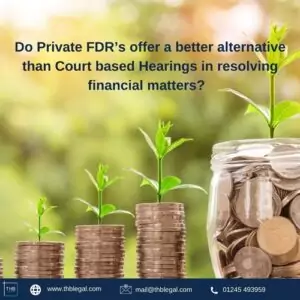Diversity Data for 2025
In accordance with SRA regulations we collect Diversity information, every two years, which is...- 04 July 2025
Posted: 20 September 2024
A Private FDR is a voluntarily entered into process which can run concurrently with, or take place prior to, financial remedy proceedings within the Court arena.

The abbreviated term “FDR” stands for Financial Dispute Resolution Hearing which is a key stage of the financial remedy proceedings.
The first Hearing, known as the “FDA” (First Directions Appointment) is the first Hearing which takes place in financial proceedings. At this Hearing, the focus will be brought to what the issues are, and what directions and information are necessary to have an effective FDR.
The FDR is most commonly the second Hearing that will take place in financial proceedings and the parties. At this Hearing, are expected to attempt to settle through negotiations between themselves, or via their respective representatives.
The matter will be called before the presiding Judge who will hear relevant evidence and will give the parties an “indication”. The indication gives the parties an insight into the likely outcome should the case go all the way to the Final Hearing. The indication can therefore be a very helpful tool should the parties be a way off in their negotiations. At this stage, most cases settle.
Those that do not agree at the FDR will go to a Final Hearing where the Judge will decide the outcome. As a point of note, the Judge who presided over the case at the FDR will not be the same Judge at the Final Hearing because they have already heard limited evidence at the FDR.
Owing to the extremely lengthy delays being faced by the Courts at the present time in listing financial cases, some people are opting to go straight to the FDR Hearing. The same evidence will be completed as if in the Court arena, but there will not be an FDA. Instead, the parties will jointly instruct a chosen Judge to conduct the FDR. Similarly to within the Court arena, the parties will go to the FDR expected to attempt to settle through negotiations and will receive an indication from the Judge which can help the parties to settle. Upon an agreement being reached, this will be drawn up into a legally binding Financial Order which will be filed at the Court for sealing.
The pitfall of a Private FDR is that the indication is not legally binding. Consequently, it is possible that the parties leave without reaching a settlement and then they must resort to the standard Court route. It is not appropriate for every case.
If you would like more information to speak to one of our family solicitors, please call on 01245 493959 or send email.
- 04 July 2025
- 30 June 2025
- 12 June 2025